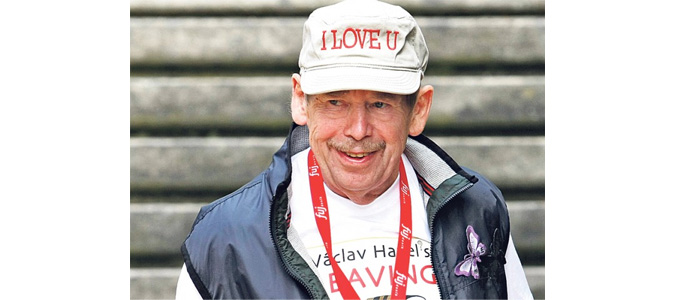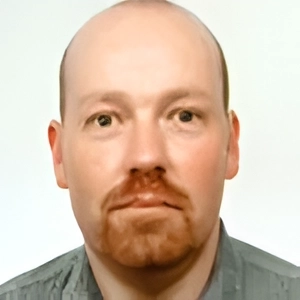Sunday, December 18, was an unreal day for me as well as a very sad one. I was passing through the Castle en route home. Black flags hung in the First Courtyard. I quickly realised why, but then I somehow managed to convince myself that someone else had passed away, which was compounded by a complete lack of other cues. Later on, I ran into a friend who told me the news. My initial instincts had been right.
Havel’s death should not have shocked me, given his poor health. Yet it did, even though I could not believe the reassurance in one of his last interviews that he would get better. His life was in danger on several occasions, and I had to remind myself of that.
PARTNER ARTICLE
When I got home that Sunday, I watched online coverage of the news on Czech Television, and I started running through all the ramifications. It was finally becoming reality, a throbbing, relentless reality. The haze of confused numbness, which often sets in upon the receipt of bad news, had abruptly cleared. Over the Christmas holidays I had some more time to reflect on that news. I have been surprised at how much Havel’s death has affected me, but as I look back at my “Czech adventure” so far, I realise how much he was part of it.
While I never knew him, he was, as many have said before, the good friend that we never met, though I had seen him several times. The first was in 1998, when I attended his honorary doctorate ceremony at Glasgow University. On the last occasion, 10 years later, I almost bumped into Havel, as I took my seat at a multi-media event entitled Misunderstanding 1968. It was held at the Archa Theatre in Prague, and marked 40 years since the Warsaw Pact invasion. For some reason, it did not even occur to me that Havel would be there, so as we filed into the auditorium, I was pleasantly surprised to see him chatting to the people beside him. It was as if brushing against ex-presidents at the local theatre was an everyday occurrence.
I am glad that I could attend these events because I respected Havel enormously for what he did and for his values. I also know that he was somebody with whom I would have had much to talk about. I strongly agreed with many of his opinions, and his sense of the absurd and refusal to take himself too seriously were refreshing.
In addition, I could identify with him in several ways, including his delight in language and words, and his reticence. I also loved the stories about Havel’s down to earth approach despite his role as the determined and charismatic leader of the Velvet Revolution, the atmosphere of which is brilliantly and movingly chronicled by political commentator Timothy Garton Ash in We The People. For example, when badges bearing the slogan “Havel for President” started appearing, he shyly asked if he could have one, almost cutting his finger as he put the badge in his pocket.
I also shared some of his interests, and as I originally came to Prague to pursue a career in building conservation, it was good to know that he was drawn to architecture and urban design. I liked the fact that Havel admired the brilliant Slovene architect Jože Plečnik, who in the first years of the new Czechoslovakia was appointed to oversee renovation and landscaping work at Prague Castle. The country’s much-loved first President, Tomáš Garrigue Masaryk, supported Plečnik, and it is fitting that the architect’s dignified and timeless designs reflect the ideas of President Masaryk, with whom President Havel shared many similarities.
Of course, Havel had his flaws, and I did not agree with all of his statements or actions, but his refusal to compromise was inspiring, refreshing and also very challenging. Havel possessed humility, wisdom, and integrity. The latter quality was especially striking when so many leaders are only interested in courting popularity and neurotically tracking it in opinion polls.
In a wider context, I was sad about Havel’s death because it marked the end of a specific period in my life, the build-up of my interest in Central Europe and then my first years living there, an era with which he is inextricably linked. Even though he left office in 2003, Havel was always there, a reassuringly constant figure.
I first heard about him at high school in the UK, in a fascinating class called Modern Studies, a combination of politics, sociology and international relations. I started the course in late 1988, just over a year before the Velvet Revolution. In my mind, that era stills seem like yesterday, but of course Europe was then – incredibly in this age of EU integration – locked in political permafrost, divided into nations that were democratic and those that were not. I was looking back to yesterday and yesteryear.
The topic that caught my imagination most was the relationship between the Soviet Union and its satellite states. Above all, we learned that they were not all the same. Poland was embracing political reform, Hungary economic reform. But Czechoslovakia’s citizens were not afforded such decadent luxuries; instead, they had to keep enduring unbending orthodoxy.
Through photocopied newspaper cuttings and other sources, we learned about Czechoslovak dissident activity and the authorities’ attempts to silence Havel and those defying the rotten Communist regime. I clearly remember seeing a television report about demonstrations in Prague in the months before the Velvet Revolution. Suddenly, coverage of the Eastern Bloc acquired a gripping vividness.
I also studied the Russian Revolution at the same time, in a history class, prompting me to wonder what it must be like to live through history when it suddenly lurches in a new direction. Just months after my Modern Studies examination, in which I wrote pages on a syllabus that would soon become history itself, I witnessed a historical turning point. The Velvet Revolution broke out, a decent, peaceful and witty revolution as one writer described it. At the centre of it was Václav Havel.

Václav Havel when filming Odcházení (Leaving)
Thanks to him and others, Christmas 1989 was especially joyful, as millions of fellow Europeans concluded the year and the decade by dispatching the Warsaw Pact’s cabal of doddery dictators to history. In the early 1990s, numerous books were written about the events of 1989. I devoured as many as possible to obtain every angle on this exciting and momentous change that I watched as it unfolded.
These books merely fuelled my fascination with Central Europe, a fascination that continued and deepened. In 1993, I paid my first to Prague, on a university field trip. It was one of the best weeks of my life. Prague itself, the “newness” of the Czech Republic and the spiky Czech language, which seemed very exotic, all intrigued me. When I returned to the UK, I wanted to know more about everything Czech. In 1996, after completing a post-graduate course in building conservation, I started to think about combining my conservation and Central European interests.
In November 1999, I came to Central Europe to investigate possible job opportunities. I spent the latter half in Prague, my stay happily coinciding with the 10th anniversary of the start of the Velvet Revolution. Like my 1993 visit, that fortnight was one of the best of my life, an exhilarating and rewarding time in the city that is now my home. Naturally, I also attended several of the 10 Let Poté events marking 10 years since the Velvet Revolution and saw Havel several times at them. Perhaps my excitement about new beginnings helped me gain a glimpse of how Czechs and Slovaks felt in 1989.
I always wished that I had been an eyewitness at these historic moments, when the air rang with thousands of voices and jingling keys, and the St Wenceslas statue was plastered with posters and slogans. Two days after Havel’s death, I went to the monument, which was covered in homemade tributes, posters and flowers, and encircled by a constantly flickering arc. November 1989 immediately came to mind. Back then, a new generation had grown up after 1968. Now, another generation had grown up after 1989. At the St Wenceslas monument I had experienced both a historic moment and a moment of finality in Czech and Slovak history – and Havel was again the focal point. The irony was achingly sad.
Despite the sadness, for me, Havel’s legacy is clear, very tangible, and long-lasting. He played a key role in ending Czechoslovak Communism, a particularly vindictive and petty brand of totalitarianism. Its demise, in turn, allowed me to move to Prague and establish myself in the Czech Republic.
Havel was there at the start of my Czech story and therefore I was determined to mark the end of his remarkable story. I am therefore proud that I could pay my respects at the Prague Crossroads centre, which he established, and at his funeral procession. I am also proud that I lived in the Czech Republic during part of his time at the Castle.
Děkuji, pane Prezidente!
Related articles












 Reading time: 7 minutes
Reading time: 7 minutes 























